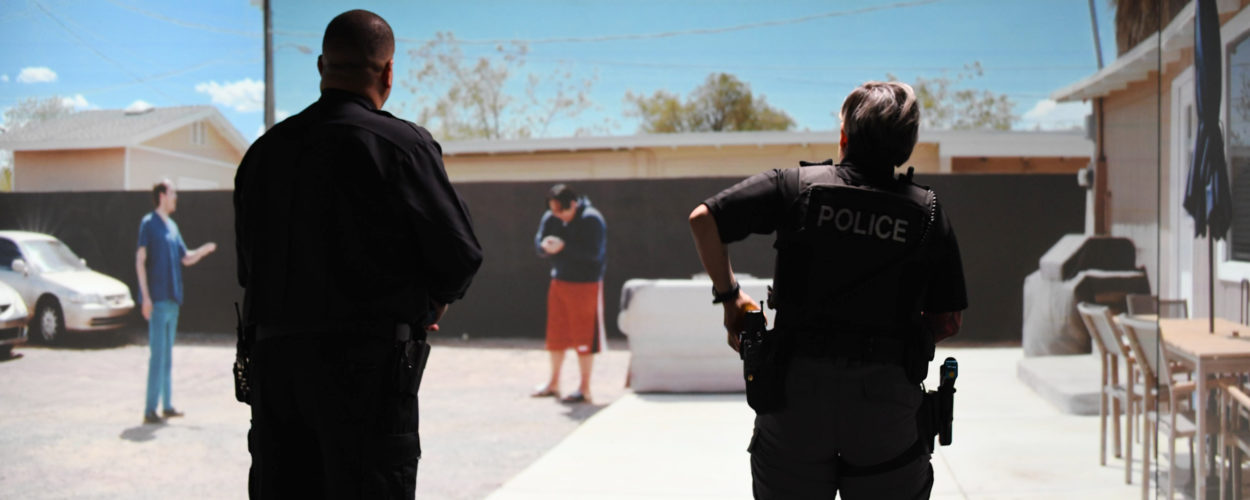
Imagine you are chasing a subject through a residential area. The suspect, a male wearing a large white sweatshirt, is jumping over fences, between shrubs and around houses. As the chase continues, the suspect begins to slow, seemingly from exhaustion. You catch up and are a few feet away when the suspect pivots sharply and raises his fist. What do you do?
It is easy to read this scenario and list off the correct sequence of actions. But in the moment, it is considerably more difficult to remember, much less perform them. This is due to law enforcement training focused on repetition rather than realism.
Repetition ≠ Perfection in Law Enforcement
The simple repetition of a skill—physical, verbal or mental—does not automatically mean the skill will be present in a time of need. Most practice takes place outside the context of an event, making the practice unrealistic and the skills ‘learned’ unreliable. For example, practicing blocking techniques with a fellow trainee for hours does not mean that skill will manifest itself when the officer is in a stressful situation in the field. There is a huge difference between classroom and reality, a stress-free environment and life-or-death. This makes practicing skills in context so crucial.
Since our memory creates instinctive responses naturally, law enforcement trainees should practice a skill in multiple scenarios and environments to truly make the skill instinctive. To prevent trainees from getting too comfortable in a routine, instructors must change use of force scenarios to different endings, incorporate new scenery and different people and items. Challenging trainees to perform skills in a variety of situations allows skills to become ingrained and stored in long-term memory. Add a stressful, adrenaline-pumping training environment and the skill practiced becomes readily available when the officer is in the field and their brain recalls the training needed.
Creating the Perfect Law Enforcement Practice
While practice sessions will vary depending on the scenario, subjects and environment, each session should be consistent in the skill practiced and the 4 Fs: Focus, Feedback, Fix and Frequency.
Focus
To maximize law enforcement solution training, trainees must develop true focus. This is keeping your thoughts dedicated to your performance, no outside stimuli or distractions. It is not going through the motions or offering passive participation. Real focus requires work, mental and physical energy and will offer a significantly better outcome in the long run.
Feedback
In practicing and continually improving, you need outside advice to better direct/improve your efforts. This most often includes an instructor or mentor relaying your correct actions and mistakes performed in a practice session. But it can also include self-feedback, such as through a video recording. Listen to what others have to say and apply their guidance.
Fix
Naturally, the next step in perfecting skill practice is to fix mistakes pointed out in the feedback stage. Establishing corrective actions may feel unnatural depending on how long the mistake was implemented, though proper practice will benefit your skill set and life in the field— a significant, long run improvement.
Frequency
The best practice comes through consistency. Establish a routine and do not deviate. Given that long-term skill building comes from practicing in a variety of environments and situations, use that dedicated training time to practice in new places with new people. However, limit practice to small chunks of time, as maximum focus and effort is difficult to sustain for long periods of time.
Instructors can maximize judgmental use of force training sessions through the use of a simulator. Each scenario is designed to create stress and heightened emotion—simulating events in the field so trainees can practice skills in the appropriate context. Seamless video transitions and extensive branching options ensure trainees are constantly learning to adapt to new situations. Contact us to learn more about how simulators can aid in creating perfect practice sessions.
Recently Published
Join Our Newsletter







